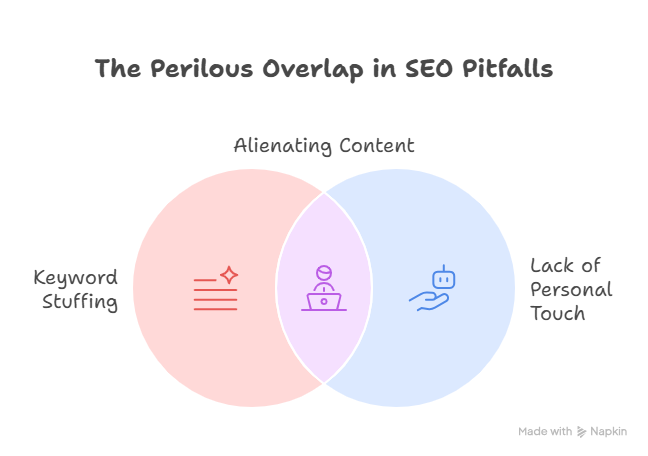Did you know that more than 80% of companies currently incorporate artificial intelligence into their content production procedures? The amount of content being created has increased dramatically as a result of this change, but it also poses crucial queries about how to make this content search engine friendly without sacrificing a brand’s distinctive character.
Knowing how to rewrite content produced by artificial intelligence for improved SEO is essential as the use of AI for content creation grows. This entails finding a balance between search engine optimization and preserving an approachable, interesting tone that appeals to readers.
The significance of rewriting AI-generated content to boost SEO without compromising your brand’s identity will be discussed in this article. We’ll offer analysis and useful advice on how to successfully strike this balance.
The Challenge of AI-Generated Content for SEO
Although AI-generated content is efficient, it frequently lacks the human touch needed for SEO to be successful. On the one hand, AI-generated content can save time and money, but on the other, it might not accurately represent the subtleties of human language and interaction.
Understanding the typical SEO problems with AI-generated content and the significance of personality in content marketing are crucial for overcoming these obstacles.
Common SEO Issues with AI Content
AI-generated content frequently lacks the human touch that readers desire and suffers from keyword stuffing. Lower search engine rankings and high bounce rates may result from this.

| SEO Issue | Description | Impact |
|---|---|---|
| Keyword Stuffing | Overuse of keywords | Penalties from search engines |
| Lack of Personal Touch | Insufficient emotional connection | High bounce rates |
Why Personality Matters in Content Marketing
In content marketing, personality is essential for establishing brand identity and capturing readers’ attention. It makes the information more memorable and relatable by fostering an emotional bond with the audience.
Businesses can increase the effectiveness and appeal of AI-generated content by adding personality to it.
How to Rewrite AI Content for SEO Success
The online visibility of AI content can be greatly increased by rewriting it with SEO in mind. Understanding the typical problems with AI-generated content and how to properly fix them is crucial to achieving this.
Identifying SEO Weaknesses in AI Writing
The subtlety required for the best search engine optimization results is often absent from AI-generated content. Typical errors include poor keyword integration, inadequate meta descriptions, and a lack of internal linking. Identifying these flaws is the first step in creating search engine-optimized content.
Keyword Integration Strategies
Successful keyword integration is essential for SEO. Long-tail keywords, meta tag optimization, and organic keyword integration into the content are ways to accomplish this. Among the crucial tactics are:
- Finding pertinent terms with keyword research tools
- Using target keywords to optimize meta titles and descriptions
- Using long-tail keywords to focus on particular search terms
Improving Content Structure for Search Engines
Content organization is essential for search engine ranking. Using header tags (H1, H2, and H3), internal linking to pertinent pages, and making sure the content is clear and educational are all part of this. You can greatly enhance the SEO performance of your content by organizing it in this way.
Maintaining Your Unique Voice While Rewriting
When rewriting AI-generated content for search engine optimization, it’s important to preserve the core of your brand’s voice. This entails making sure the content speaks to your audience personally as well as adapting it to search engine algorithms.
Adding Personal Touches
Including personal tales and experiences is a powerful technique to increase the relatability of AI-generated content. In addition to humanizing the content, this strategy increases reader engagement. A layer of authenticity can be added, for example, by sharing a story about how a specific product or service benefited your business or clients.
Brand-Specific Language
Another essential component of keeping your distinct voice is incorporating language that is specific to your brand. This entails utilizing language, expressions, and tone that are in line with the identity of your brand. By doing this, you make sure that all of your content sounds like it was produced by the same person, regardless of where it came from.
| Brand Element | Description | Example |
|---|---|---|
| Tone | The attitude or feeling conveyed by the content. | Using a friendly tone to engage readers. |
| Language | The specific words and phrases used. | Incorporating industry-specific jargon. |
| Style | The overall presentation and formatting. | Using short paragraphs for better readability. |
Balancing SEO with Authenticity
It’s challenging to strike a balance between genuine expression and technical SEO requirements. It entails making sure the content is engaging and consistent with the voice of your brand while optimizing it with pertinent keywords, meta descriptions, and headings. You can increase your content’s search engine visibility without compromising its authenticity or quality by striking this balance.
Conclusion: Creating the Perfect Balance Between AI Efficiency and Human Creativity
One of the most important steps in producing excellent, search engine optimization-optimized content that appeals to your target audience is rewriting AI-generated content. You can enhance SEO with rewritten content and raise search engine rankings by recognizing SEO flaws, incorporating pertinent keywords, and preserving your distinct brand voice.
The secret to creating interesting content is finding a balance between AI effectiveness and human creativity. Although artificial intelligence (AI) tools can expedite the creation of content, human oversight is required to give your brand’s messaging personality and authenticity. You can produce content that not only performs well in search results but also builds deep relationships with your audience by using the techniques described in this article.
The ultimate objective is to create interesting and educational content. You can accomplish this and advance your content marketing endeavors by rewriting AI content with an emphasis on SEO and brand personality.
FAQ
What are the benefits of rewriting AI-generated content for SEO?
Rewriting AI-generated content for SEO can improve search engine rankings, increase brand engagement, and maintain a unique brand personality. By optimizing AI content, you can ensure it is both search engine-friendly and engaging for readers.
How do I identify SEO weaknesses in AI-generated content?
To identify SEO weaknesses in AI-generated content, look for issues such as poor keyword integration, lack of meta descriptions, and inadequate header tags. Analyzing the content’s structure and keyword usage can help you pinpoint areas for improvement.
Can I use automated content rewriting tools for SEO optimization?
While automated content rewriting tools can be helpful, they may not always produce high-quality, SEO-optimized content. It’s essential to review and edit the output to ensure it meets your brand’s standards and is optimized for search engines.
How can I maintain my brand’s unique voice while rewriting AI-generated content?
To maintain your brand’s unique voice, add personal anecdotes and experiences, inject brand-specific language, and balance technical SEO requirements with authentic expression. This will help ensure the content is both optimized for search engines and engaging for readers.
What are some effective keyword integration strategies for SEO?
Effective keyword integration strategies include using long-tail keywords, optimizing meta tags, and incorporating keywords naturally throughout the content. This can help improve the content’s visibility in search engine results.
How can I improve the structure of AI-generated content for search engines?
To improve the structure of AI-generated content, use header tags, internal linking, and a clear, concise writing style. This will help search engines understand the content’s hierarchy and relevance, improving its visibility in search results.
What is the role of artificial intelligence in content creation?
Artificial intelligence can aid in content creation by generating ideas, providing research assistance, and automating certain tasks. However, it’s crucial to review and edit AI-generated content to ensure it meets your brand’s standards and is optimized for search engines.
Can rewriting AI-generated content improve its SEO performance?
Yes, rewriting AI-generated content can significantly improve its SEO performance. By optimizing the content for keywords, meta tags, and structure, you can improve its visibility in search engine results and drive more traffic to your website.




